Mark Anthony Neal's Blog, page 635
March 16, 2016
The Kennedy Center Presents A Conversation with Malcolm-Jamal Warner
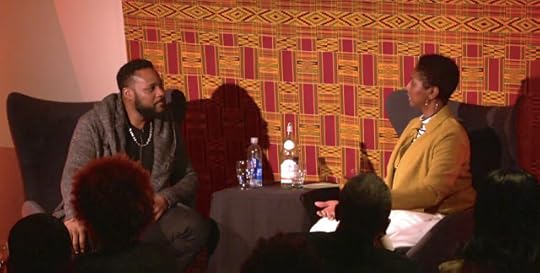 'A conversation with Malcolm-Jamal Warner, moderated by Howard University Professor Dr. Dana Williams of Howard University, regarding media bias and racial perception, as viewed through the lens of popular culture.'
'A conversation with Malcolm-Jamal Warner, moderated by Howard University Professor Dr. Dana Williams of Howard University, regarding media bias and racial perception, as viewed through the lens of popular culture.'
Published on March 16, 2016 04:46
The Lasting Fear of Flint’s Water Crisis
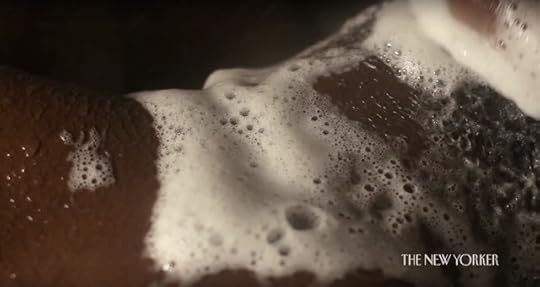 'What happens when you’re afraid to drink, or bathe, or brush your teeth? Parents and children from the city of Flint, Michigan, speak out about the psychological effects of living with contaminated water.' -- +The New Yorker
'What happens when you’re afraid to drink, or bathe, or brush your teeth? Parents and children from the city of Flint, Michigan, speak out about the psychological effects of living with contaminated water.' -- +The New Yorker
Published on March 16, 2016 04:38
March 15, 2016
Media and the Rise of Donald Trump with Christina Greer + Jack Oliver
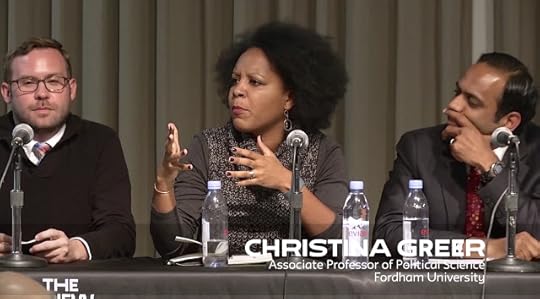 'Christina Greer, Associate Professor of Political Science at Fordham University, and Jack Oliver, Finance Chair, Right to Rise PAC, explain the unprecedented media coverage surrounding Donald Trump and the importance of Twitter.' -- +The New School
'Christina Greer, Associate Professor of Political Science at Fordham University, and Jack Oliver, Finance Chair, Right to Rise PAC, explain the unprecedented media coverage surrounding Donald Trump and the importance of Twitter.' -- +The New School
Published on March 15, 2016 05:49
Writers Darryl Pinckney & Zadie Smith on Black Deutschland + Black Achievement + Beyoncé
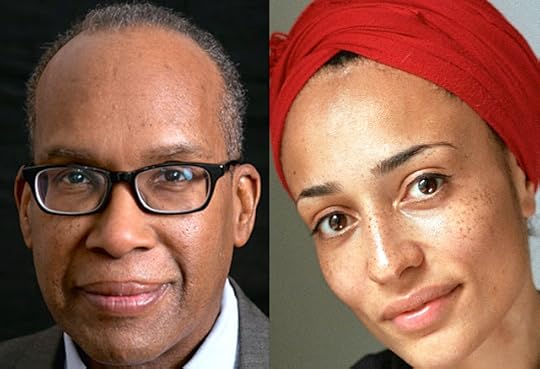 'Darryl Pinckney and Zadie Smith talk about his new work of fiction, Black Deutschland, set in the 1980s, about a young gay black American who flees from his hometown of Chicago to the city of his fantasies: Berlin, as well as Black achievement and Beyonce.'
'Darryl Pinckney and Zadie Smith talk about his new work of fiction, Black Deutschland, set in the 1980s, about a young gay black American who flees from his hometown of Chicago to the city of his fantasies: Berlin, as well as Black achievement and Beyonce.'
Published on March 15, 2016 05:40
March 14, 2016
The Revolution Will Not Be Animated: Not Quite Zootopia by David J. Leonard
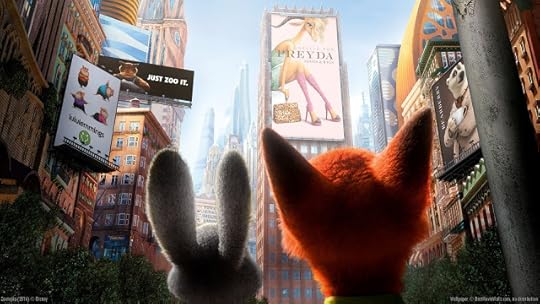 The Revolution Will Not Be Animated: Not Quite Zootopiaby David J. Leonard | @DrDavidJLeonard | NewBlackMan (in Exile)
The Revolution Will Not Be Animated: Not Quite Zootopiaby David J. Leonard | @DrDavidJLeonard | NewBlackMan (in Exile)Despite it's immense possibilities and strengths, Zootopia’s reliance on “we are all prejudiced,” its historic revisionism, and its tepid critique of policing, offers more of the same Hollywood.
While animation films (like science fiction films) often facilitate conversations suppressed and silenced in other cultural spaces, Zootopia does something different in terms of popular culture discourses surrounding race. It is not the clichéd film on difference or not judging a “book by its cover;” it doesn’t leave us with ubiquitous message of prescriptive colorblindness and change simply as about rewiring our brains.
Although giving the classic “interracial buddy film” (America’s ‘Huck Finn fixation” extends into the anamorphic realm), it pushes a conversation beyond individual prejudice to look at scientific racism, racial profiling, affirmative action, suburbanization, and segregation; it encourages audiences to reflect on the politics of racial fear, and to look at the ways that ideology has been used for white supremacist hegemony.
Zootopia pushes audiences to look at the myth of meritocracy, demanding that we move beyond the binary of “good versus bad.” In making Judy Hopps (voiced by Ginnifer Goodwin) the hero, one implicated by her own assumptions of the Other and one who routinely speaks on widely held stereotypes, Zootopia offers a narrative that focuses on institutional and systemic inequality. While a story of individual bias and individual complicity, Zootopia is also a film that offers some discussion centering power, inequity, and the state.
Given its engagement with ubiquitous discussions of race, the film is clearly timely. It demonstrates how fear of a constructed Other is used to maintain power in the hands (or paws … hooves) of the dominant group. Zootopia demonstrates the power of racial fear, one based in criminalization and cultural racism that has been used to secure hegemony. We see Donald Trump in sheep’s clothing.
Yet, the film is even contradictory here as the Assistant Mayor Bellwether’s (voiced by Jenny Slate), a sheep, is used to highlight how everyday prejudice and micro aggressions operate in Zootopia and our own world. We see Nick Wilde (voiced by Jason Bateman) touching Bellwether’s hair as a clear nod to hair politics and also references to fact that she has had to work twice as hard to get ahead.
This is true for Hopps as well. “It’s a saying heard in black households around the world: You have to work two, three, four or five times as hard as your white counterparts to accomplish the same goals, writes Samantha Antrum.. “Officer Hopps experiences this first-hand, first in the police academy and again as she receives her first assignment from a prejudiced Chief Bogo (voiced by Idris Elba). Hopps must constantly prove herself in order to accomplish the simplest of tasks.”
Yet, neither Hopps nor Bellwether are “minoritized” and “disempowered” by the power structure. They have power and privilege; they are normalized. In placing every animal as facing prejudice, as defined by stereotypes, the film, at best, offers a muddied history that ultimately rewrites the history of white violence and white supremacy.
Still, the film’s examination of American white supremacy through its own narrative offers an important intervention. Its usage of the tropes of “prey” and “predator” (“civilization” and “savagery”) speaks to a broader historic intervention given America’s history of colonization and the conquest. Similarly, it works in concert with the racial histories of ‘predators” and “super predators” within the war on drugs and the era of mass incarceration.
Yes, Hillary Clinton the film indirectly puts your racist comments and the ways that white America has used racist policies and practices to maintain political power in full view. “'As the race for the Democratic nomination for this year’s election have intensified, many have taken firm stances against Hillary Clinton for positions she took in the 90s in regards to the now disproven idea of the ‘super predator,’ writes Charles Pulliam-Moore. “The parallels between the super predator myth and Zootopia‘s literal media panic about predators might not have been intentional, but they’re striking and difficult to ignore.”
Jason Johnson sees similar power here with the film’s indictment of the continued war on drugs: “As a result of this new drug epidemic, predators are denied jobs, demoted from positions of influence and treated like menaces to society. When Judy and Nick finally crack the case, what do they discover? The drugs were being pumped into the predator community by the assistant mayor, Dawn Bellwether, a white fuzzy sheep," as Johnson notes "It’s straight out of the realization that members of the CIA either wittingly or unwittingly helped introduce crack cocaine into minority communities in the 1970s and ’80s, even though the press and some political leaders denied it for years.”
While clearly a powerful allegory for the war on drugs, the film’s narrative, which represents the drug epidemic as only impacting “predators,” belies history and its allegorical utility. While Blacks and Latinos have consistently imagined as threats to the moral fabric, as “drug users,” White America has been getting high with impunity.
Despite its efforts to enter into the conversation, the film’s marketing and its own history points to its place within a Hollywood structure that remains defined by its whiteness.
I cannot help but to wonder why the studio has marketed the film with little regard for its politics. The decision to use the scene at DMV with sloths as “selling” point might be a strategic effort to conceal the politics in the film or an effort to undercut the critical work that is offered on screen. Wanting to enter into these conversations without experiencing the economic consequences of “white fragility “ Zoopedia represents a missed opportunity.
It is also striking how few actors of color are part of the film. Only Idris Elba would be considered a “main character.” Of the writers and directors, there is only one person of a color (Josie Trinidad). It is yet another reminder that we need discussions of the politics of production, reflecting on how the lack of diversity in Hollywood cuts across all genres.
Zootopia pushes a lot of important conversations but let’s not get twisted: Zootpia isn’t the cinematic soundtrack for #BlackLivesMatters. As Alexandro José Gradilla noted in a Facebook discussion, the film ultimately falls short in terms of its critiques of policing. It calls for a policing reform and a shift in culture (more diversity equals more humanity in policing) rather than the radical reimagination of policing in this country.
The revolution will not be animated. And it most certainly won’t come from Disney.
+++
David J. Leonard is Professor in the Department of Critical Culture, Gender and Race Studies at Washington State University, Pullman. Leonard's latest books include After Artest: The NBA and the Assault on Blackness (SUNY Press), African Americans on Television: Race-ing for Ratings (Praeger Press) co-edited with Lisa Guerrero and Beyond Hate: White Power and Popular Culture with C. Richard King. He is currently working on a book Presumed Innocence: White Mass Shooters in the Era of Trayvon about gun violence in America. You can follow him on Twitter at @drdavidjleonard.
Published on March 14, 2016 17:54
Edwidge Danticat Looks at Racist Violence in American Art
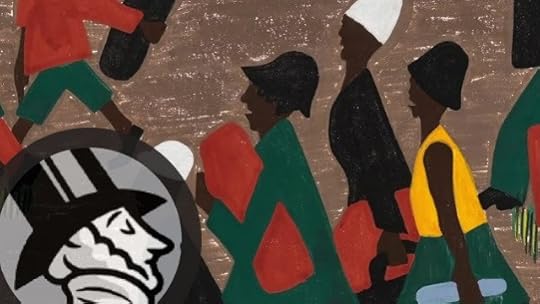 A clip from “Black Bodies in Motion and in Pain" with Edwidge Danticat from the new series The New Yorker Presents.
A clip from “Black Bodies in Motion and in Pain" with Edwidge Danticat from the new series The New Yorker Presents.
Published on March 14, 2016 15:51
Between the Lines: Michael Eric Dyson + Joy Reid Talk The Black Presidency
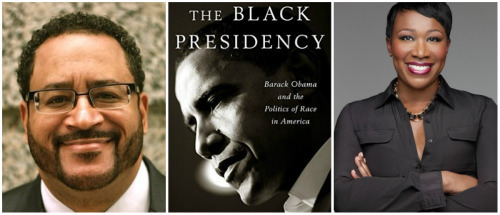 'Michael Eric Dyson and Joy Reid discuss his provocative new book, The Black Presidency: Barack Obama and the Politics of Race in America. -- +Schomburg Center
'Michael Eric Dyson and Joy Reid discuss his provocative new book, The Black Presidency: Barack Obama and the Politics of Race in America. -- +Schomburg Center
Published on March 14, 2016 07:19
Alessia Cara & The Roots --"Here" [10th Annual Roots Jam Session]
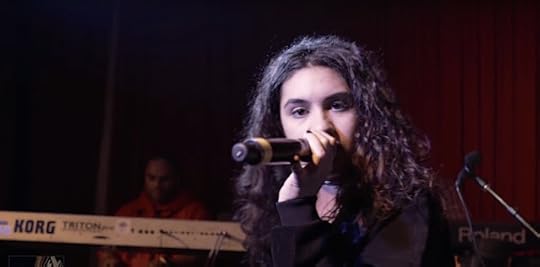 'Alessia Cara joins The Roots at the 10th Annual Roots Jam Session in LA to perform her hit single “Here”.
'Alessia Cara joins The Roots at the 10th Annual Roots Jam Session in LA to perform her hit single “Here”.
Published on March 14, 2016 07:09
Collecting + Curating Black: on the Work by Artists of African Descent
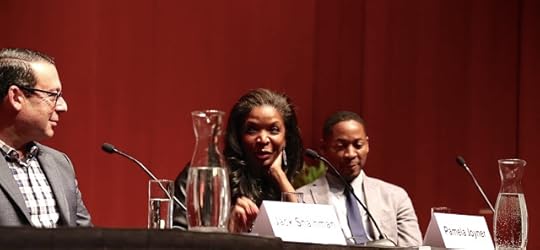
'The +Nasher Museum hosted a lively conversation on collecting and presenting work by artists of African descent, with New York Times art critic Holland Cotter, Studio Museum in Harlem Director Thelma Golden, San Francisco art collector Pamela Joyner, New York gallery owner Jack Shainman and Pérez Art Museum (Miami) Director Franklin Sirmans on February 11, 2016. The panel was moderated by Richard J. Powell, John Spencer Bassett Professor of Art and Art History at Duke, and curator of the traveling exhibition, Archibald Motley: Jazz Age Modernist.'
Published on March 14, 2016 06:55
March 13, 2016
Can Algorithms Be Racist?
 'Some believers in big data have claimed that, in big data sets, “the numbers speak for themselves.” Or in other words, the more data available to them, the closer machines can get to achieving objectivity in their decision-making.' -- +PRI Public Radio International
'Some believers in big data have claimed that, in big data sets, “the numbers speak for themselves.” Or in other words, the more data available to them, the closer machines can get to achieving objectivity in their decision-making.' -- +PRI Public Radio International
Published on March 13, 2016 18:18
Mark Anthony Neal's Blog
- Mark Anthony Neal's profile
- 30 followers
Mark Anthony Neal isn't a Goodreads Author
(yet),
but they
do have a blog,
so here are some recent posts imported from
their feed.



